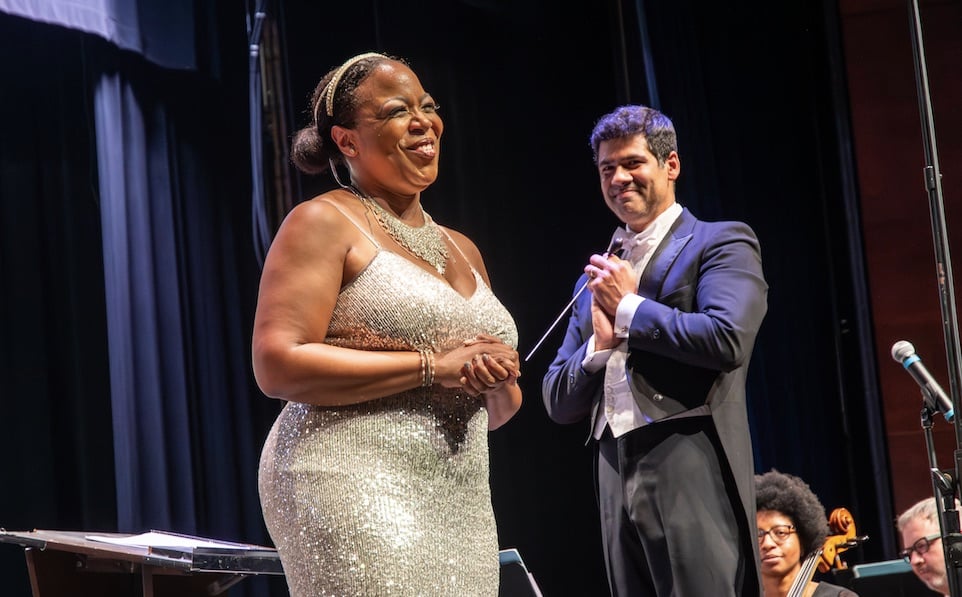The Dekalb Symphony Orchestra launched its 2023-24 season on Tuesday with an evening that featured soprano soloist Maria Clark. Now fully entrenched in the leadership of musical director and conductor Paul Bhasin, the community orchestra seems to be finding a stronger footing even if it still struggles with consistency.
After a short ceremony that honored the DSO’s longest serving players, the concert in the Marvin Cole Auditorium on Georgia State University’s Perimeter College Clarkston campus began with the overture to Wolfgang Amadeus Mozart’s Costi fan Tutte.
The opening cavalcade saw a couple of players rush out ahead of the maestro’s baton but the orchestra as a whole came together nicely with the rapid fire dialogue between flute and oboe playing off one another well. The DSO still lacks the fire and fury of its professional counterparts, but Bhasin’s leadership has been a step in the right direction.
The evening’s featured soloist, the critically acclaimed soprano Maria Clark, brought a captivating presence.
Clark’s strongest showing came in “No Word From Tom” and “I go, I go to him” from Igor Stravinsky’s The Rake’s Progress. Clark has formidable breath support and it provides a foundation for her prodigious projection that reaches beyond the capacity of most sopranos. In that regard her onstage presence is as disarming as it is captivating.

Clark shines within the clear cut boundaries of the opera but her technical command was strained by the inclusion of three spirituals arranged for orchestra and operatic voice by pianist and composer Maria Corley. “Steal Away” began with her bold signature delivery but the traditionally operatic sound never felt as though it meshed with the larger whole of the blues and gospel influenced sound.
“I Want Jesus to Walk With Me” opened with a long acapella segment that saw Clark waver in her delivery at the most unfortunate possible moment. As she brought the final phrase of the section to a close, her wind ran out. For a harrowing instant she lost support of the note and was forced to finish the line in her speaking register. The phrase, whose stirring drama was meant to cue the orchestra, was deprived of its’ larger impact. Like a top gymnast who delivers a stunning performance only to fail to stick the landing, Clark’s noticeable slip marred an otherwise technically stellar performance.
By the time Clark and company arrived at “His Name So Sweet,” the final piece in the trio of spirituals, it was clear that the cross-genre experiment had yielded middling results. The DSO found an admirable degree of atmospheric subtlety in their rendering of the somber blues aura but the work as a whole failed to be more than the sum total of its parts. The spiritual calls for a particular voice — one based not in the hallowed halls of opera but in the euphoric realms of the gospel choir. Without that genre-specific vocal tonality, the disparity between voice and orchestra became a venn diagram that never quite overlaps.
The DSO’s third and final piece of the evening, Antonín Dvořák’s ninth and final symphony “From the New World,” afforded the plucky community orchestra an opportunity to puff out its chest. The work is an ever escalating steamroller of imposing themes and ominous grandeur.
While the DSO commonly plays with a sense of self-aware humility, their playing on Dvořák’s ninth symphony was full of bold and steady command that imposed confidently on the listener. It was a captivating and thrilling end to the evening and one that brought forth tremendous applause from the capacity audience.
“What you see on stage, to me, represents something very important in American society,” said Bhasin in his mid-concert remarks. “Cohorts of citizen musicians- people who share their musicianship, their artistry, with their community for the purposes of building, enriching, and strengthening the connection between one another. This is something our society needs in great measure.”
Such words are as admirable as they are true and serve as a fine mission statement for the Dekalb Symphony Orchestra’s 2023-24 season.
::
Jordan Owen began writing about music professionally at the age of 16 in Oxford, Mississippi. A 2006 graduate of the Berklee College of Music, he is a professional guitarist, bandleader and composer. He is currently the lead guitarist for the jazz group Other Strangers, the power metal band Axis of Empires and the melodic death/thrash metal band Century Spawn.

